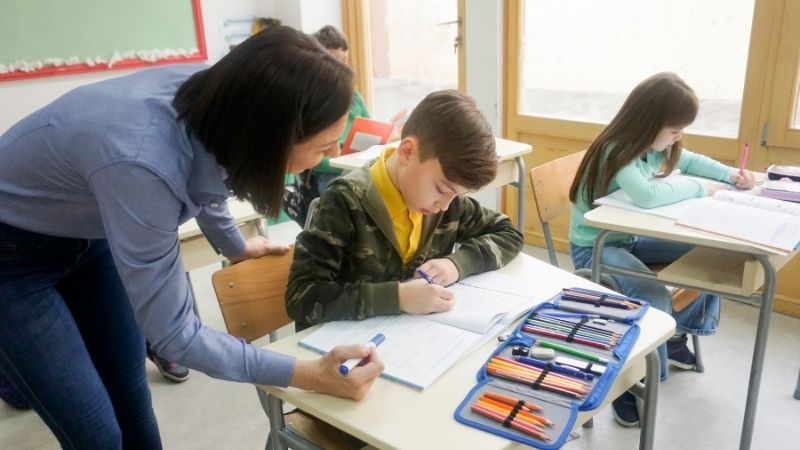
In today's fast-paced and technologically-driven society, the importance of mathematics in elementary education cannot be overstated. As students embark on their educational journey, they are equipped with a set of problem-solving skills that will serve as the foundation for future academic success.
Through the development of number sense, mastery of basic operations, introduction to multiplication, exploration of beginner's geometry, and tackling word problems with confidence, students gain not only mathematical competence but also the ability to think critically and approach challenges analytically.
This article aims to illuminate the significance of math in elementary education by highlighting its role in fostering problem-solving prowess.
Key Takeaways
- Number sense is fundamental in elementary math education as it develops understanding and fluency with numbers, enabling students to solve mathematical problems effectively and make connections between different concepts.
- Proficiency in addition and subtraction is crucial in elementary education, and mastering these basic operations provides a strong foundation for solving complex problems.
- Multiplication builds upon the mastery of basic operations and lays a strong foundation for understanding fractions, division, and algebraic equations.
- Beginner's geometry in elementary education introduces students to various geometric shapes, develops spatial reasoning skills, enhances problem-solving abilities, and fosters appreciation for the beauty and orderliness of geometrical forms. Additionally, solving word problems enhances problem-solving skills, critical thinking, and analytical thinking skills by applying math concepts to real-life situations.
The Power of Number Sense
Number sense is a fundamental aspect of elementary math education, serving as a foundation for students to develop an understanding and fluency with numbers. It plays a pivotal role in developing problem-solving skills and applying number sense in real-life situations.
By cultivating number sense, students gain the ability to manipulate numbers flexibly and efficiently. They learn to identify relationships between numbers, estimate quantities, compare magnitudes, and recognize patterns. These skills enable them to solve mathematical problems more effectively and make connections between different mathematical concepts.
Moreover, number sense extends beyond the confines of the classroom, as it empowers students to apply their understanding of numbers in various real-life scenarios such as shopping, budgeting, or measuring ingredients while cooking.
Thus, fostering strong number sense is crucial for equipping students with the tools they need to navigate numerically-rich environments with confidence and competence.

Mastering Basic Operations
One crucial aspect of elementary education is the acquisition of proficiency in fundamental mathematical procedures, such as addition and subtraction. Efficient strategies for mental math and the importance of practicing basic operations regularly are key components in developing mathematical fluency. By mastering these skills, students gain a strong foundation that enables them to solve more complex problems in the future.
Teachers play a vital role in guiding students towards efficient strategies for mental calculation, such as breaking numbers down into smaller parts or using known facts to derive new ones. Regular practice of addition and subtraction allows students to become more comfortable with numbers and improves their overall problem-solving abilities.
As students become proficient in basic operations, they unlock the world of multiplication, which will be explored in the subsequent section.
Unlocking the World of Multiplication
Multiplication, a fundamental mathematical operation that involves combining groups of equal size, is a key concept that builds upon the mastery of basic operations in elementary education. Understanding multiplication as repeated addition helps students grasp the concept more easily. By recognizing that multiplying two numbers represents adding one number to itself multiple times, children can better comprehend the relationship between addition and multiplication.
Additionally, using arrays as a visual tool aids in understanding multiplication. Arrays provide a structured way to represent and visualize groups of objects or numbers being multiplied together. This visual representation helps students see how the rows and columns in an array correspond to the factors being multiplied.
Mastering multiplication lays a strong foundation for further mathematical concepts like fractions, division, and algebraic equations. Exploring the wonders of beginner's geometry builds upon this solid foundation.
Exploring the Wonders of Beginner's Geometry
Geometry, a branch of mathematics that deals with the properties and relationships of points, lines, shapes, and spaces, is an important area of study in elementary education.

The study of geometry introduces students to various geometric shapes and their real-world applications. Through beginner's geometry, students develop spatial reasoning skills which are crucial for understanding the physical world around them.
By exploring concepts such as symmetry, congruence, and transformations, students learn how to analyze and manipulate geometric figures. This helps them understand patterns and structures in nature and everyday objects.
Moreover, studying geometry enhances problem-solving abilities by encouraging logical thinking and deductive reasoning. Students also gain a deeper appreciation for the beauty and orderliness inherent in geometrical forms.
Overall, introducing beginner's geometry at an early age lays a strong foundation for further mathematical learning while fostering critical thinking skills essential for broader academic success.
Tackling Word Problems With Confidence
Tackling word problems requires a solid understanding of mathematical concepts and the ability to apply them accurately in real-life situations. This is an essential skill for students as it helps develop critical thinking skills and allows them to apply math concepts to real-life situations. Here are three reasons why tackling word problems is important in elementary education:
Enhancing problem-solving skills: Word problems present students with real-world scenarios that require critical thinking and logical reasoning to solve. By solving these problems, students develop their problem-solving skills, which are valuable in various aspects of life.
Applying math concepts: Word problems provide opportunities for students to apply the math concepts they have learned in class to real-life situations. It helps them make connections between abstract mathematical ideas and practical applications.

Developing analytical thinking: Word problems often involve multiple steps and require careful analysis of the given information. Solving these problems helps students develop analytical thinking skills by breaking down complex tasks into smaller, manageable parts.
Frequently Asked Questions
How Does Number Sense Develop in Elementary Students?
Number sense develops in elementary students through hands-on activities and real-life applications. These experiences provide opportunities for students to explore and manipulate numbers, fostering an understanding of their relationships and the ability to solve mathematical problems.
What Strategies Can Be Used to Teach Addition and Subtraction to Elementary Students?
Effective teaching strategies for addition and subtraction in elementary education involve using manipulatives, visual aids, and real-life examples. Introducing multiplication can be done through repeated addition and skip counting techniques, fostering a strong foundation in mathematical operations.
Why Is Multiplication an Important Concept for Elementary Students to Learn?
The importance of multiplication in elementary education lies in its ability to provide a foundation for advanced mathematical concepts. By incorporating real-world examples, students gain a deeper understanding and appreciation for the practical applications of multiplication in their everyday lives.
How Can Geometry Be Introduced to Young Learners in an Engaging Way?
Introducing geometry to young learners in an engaging way can be achieved by employing creative approaches and incorporating hands-on activities. This enhances their understanding of spatial concepts and develops problem-solving skills.
What Are Some Effective Problem-Solving Strategies for Elementary Students to Use When Solving Word Problems?
Effective problem-solving strategies for elementary students involve fostering critical thinking skills. Students should be encouraged to analyze the problem, break it down into smaller parts, use logical reasoning, and employ strategies such as drawing diagrams or making a list of possible solutions.
 Careers in EducationElementary EducationHigh School EducationEducational TechnologyTeaching StrategiesSpecial EducationPrivacy PolicyTerms And Conditions
Careers in EducationElementary EducationHigh School EducationEducational TechnologyTeaching StrategiesSpecial EducationPrivacy PolicyTerms And Conditions
